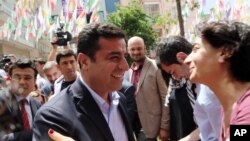Turkey’s HDP party achieved an electoral breakthrough in the June 7th election, becoming the first pro-Kurdish party to win representation in parliament. This breakthrough was made possible in part by the fact that large numbers of non-Kurdish Turks embraced the party's message of pluralism and democratic rights. The HDP’s success gives hope that ethnic divisions between Turks and Kurds can be bridged.
Supporters of the HDP celebrated into the early hours of the morning after the election, in which the party cleared the 10 percent electoral threshold required to enter parliament. That threshold is widely seen as having been deliberately set by Turkey’s former military rulers when they wrote the country's constitution more than 30 years ago, in order to keep pro-Kurdish parties out of the parliament. But the HDP easily passed the threshold in the election earlier this month, securing 13 percent of the votes.
Sinan Ulgen, a visiting scholar at Carnegie Europe in Brussels, says a key part of the HDP’s success was winning over Turkish voters with its pro-democracy platform.
"This desired transformation or least attempted transformation of HDP from a purely ethnic party to a more nationwide party - that's paid off. What we see is support for HDP across the board, but especially among the Turkish liberals who found this pro-democracy campaigning of HDP appealing," said Ulgen.
Turkish voters had been reluctant to support pro-Kurdish parties because of their suspected links to the Kurdish rebel group the PKK, which has been fighting the Turkish state for greater minority rights since 1984. But for more than two years, the PKK has been observing a ceasefire as part of a fragile peace process with Ankara.
The conflict has claimed over 40,000 lives and created deep a ethnic divisions. But Cengiz Aktar, a political scientist at Istanbul’s Suleyman Sah University, says the HDP's strong showing in the June 7 election offers hope for bridging that divide.
"This is the very message of 7th June. At least parts of Turks are ready to accept Kurds as they are and they are ready to go a long way with them in terms of sharing power," said Aktar.
But the HDP's electoral success was not simply due to support from non-Kurdish Turkish voters. Large numbers of Kurdish voters abandoned the former ruling party, the AKP. In the predominantly Kurdish southeast the AKP, whose support in the region once rivaled the HDP's, suffered historic losses, with its voting base collapsing in many areas.
HDP deputy head Ertugrul Kurkcu says this collapse of support for the AKP was due to President Recep Tayyip Erdogan’s failure earlier this year to help Syrian Kurds resist Islamic State forces in the Syrian city of Kobani on Turkey’s border.
"Every Kurd felt that what Tayyip Erdogan is expecting for Kobani - this was the destruction of Kobani by the IS forces. This means the raping of women, and selling of women in the markets, the slaughtering of men. So their hearts were broken really, the Kurdish voters, AK voters," said Kurkcu.
The Islamic State's siege of Kobani was only lifted after the United States intervened with air strikes and airdrops of military supplies, against Ankara’s wishes.
On Friday, a headline in a pro-AKP newspaper called Syrian Kurdish forces more dangerous than the Islamic State. The AKP and Turkish nationalists fear gains by the Syrian Kurds could lead to similar demands for autonomy from Turkey's Kurdish minority.
While insisting his party remains centered on Kurdish demands, the HDP’s Kurkcu says it can also represent other sectors of Turkish society.
"Without the Kurds, HDP is nothing. But demands for secession are long thrown out from the program of both the PKK and [the] Kurdish liberation movement. Therefore [it is] very much feasible to conduct such a strategy of democracy for all," he said.
On election night, HDP co-leader Selahattin Demirtas acknowledged that many in Turkey had only lent their support, but promised his party would not embarrass them. That comment was widely seen as aimed at Turkish voters.
Analysts say the HDP faces the balancing act of consolidating the support of newly-won Turkish voters, but at the same time pursuing its Kurdish demands. That balancing act, analysts warn, could prove increasingly difficult, with growing questions over the sustainability of the ongoing peace process with the PKK, which remains frozen.




